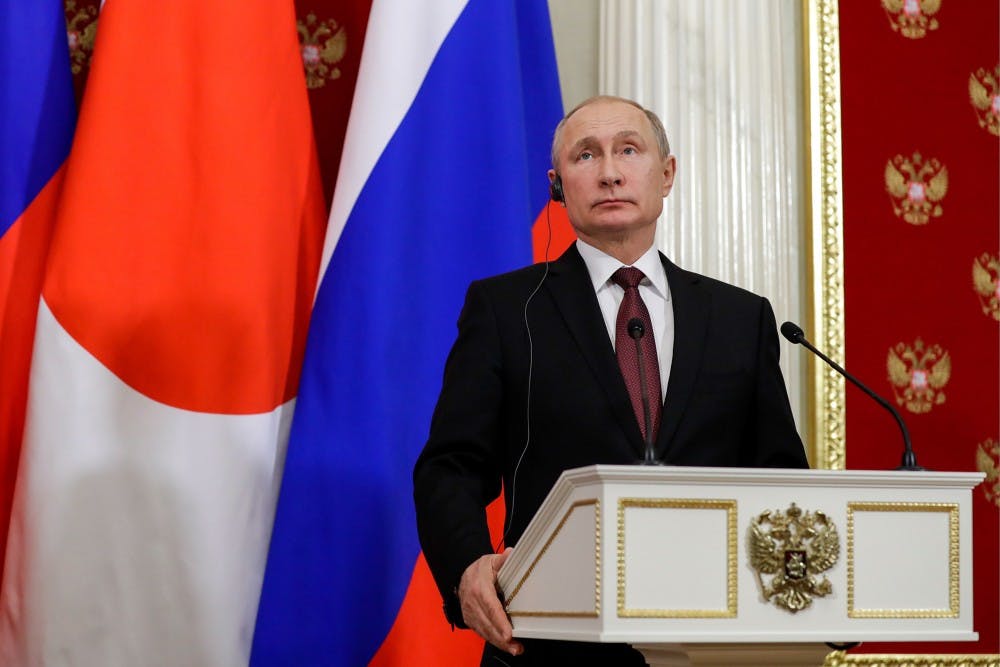The withdrawal of the United States from the Intermediate Range Nuclear Forces Treaty received a standing ovation by some members of Congress at this year’s State of the Union.
However, the U.S. withdrawal from the INF treaty could have a potential for a new nuclear arms race and divide the U.S. from its European allies.
Former Sen. Richard Lugar, R-Ind., warned President Trump last October to not withdraw from the treaty. In a statement released by the Lugar Center he said, “Withdrawal from the treaty would diminish U.S. standing and options in the European theater, which has been vital to our own security for over a century.”
Now, almost three decades after the end of the Cold War, Russia and the U.S. may find themselves in a renewed arms race. The INF Treaty, signed in 1987 by former Soviet leader Mikhail Gorbachev and former president Ronald Reagan, was meant to ban the development and use of land-based ballistic missiles with ranges of 310 to 3,420 miles.
Unsurprisingly, both Russia and the U.S. are accusing each other of violating the treaty by developing ballistic missiles that fit the banned range capability.
CIA Director Gina Haspel confirmed Russia’s violation of numerous treaties including the INF at a recent Senate hearing. Meanwhile, Russia accuses the U.S. of installing defense systems capable of launching intermediate-range missiles in Romania.
The most pressing ramification of this decision is that it drives a wedge between the U.S. and our European allies. The lifting of the ban on land-based intermediate range missiles puts all of Europe at risk of a nuclear strike. With the exception of Alaska, the U.S. is well protected by the Pacific Ocean from any land-based intermediate range missile attack.
It is an all too common trend in the Trump administration to put America first and leave our allies out to dry. However, in the long-term, decisions like this one are not putting America first. One day our allies will not hesitate to do the same to us in our time of need.
Withdrawing from the INF treaty does not mean the world is at the brink of nuclear war. It does mean that both Russia and the U.S. will now openly develop intermediate range missiles once again.
The broader consequences of this decision lie in the foreign policy philosophies of certain officials in the Trump administration such as National Security Adviser John Bolton.
On several occasions, Bolton has spoken out against arms control agreements, including the Iran Deal and another U.S.-Russia arms reduction agreement called the New Start Treaty, which expires in 2021.
Bolton’s isolationist zeal has led him to speak out against the North Atlantic Treaty Organization and the United Nations, which are bastions of global stability. His views are alarming considering that he has the ear of Trump, who is known to make erratic decisions when it comes to world affairs.
Although the INF treaty did not do much to stop Russia from violating it, scrapping the treaty in its entirety will not deter Russia from stockpiling nuclear weapons either. The treaty also failed to consider rising third-party nuclear powers such as China, Iran and possibly North Korea.
Many of the Cold War nuclear arms reduction treaties need to be adapted to present day to include countries besides the U.S. and Russia. Additionally, serious steps need to be taken to abolish nuclear weapons.
The rise of many third-party nuclear powers is a sign that there is an increased likelihood of a nuclear catastrophe happening. The United States and Russia have to prevent another nuclear arms race in order to focus on more imminent existential threats like climate change.






